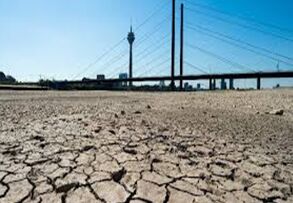研究表明 高温让世界更危险
On excessively hot days, there are more likely to be fatal car accidents and food safety problems, and police officers and government food inspectors tend to do less of their duties, according to a study published in the Proceedings of the National Academy of Sciences.
根据发表在《美国国家科学院院刊》上的一项研究表明,在过度炎热的天气里,更容易发生致命的车祸和食品安全问题,而且警察和政府食品检查人员在这样的天气履行职责时往往也没有平日认真。
The Massachusetts Institute of Technology scientists, who analyzed data from across the United States, suggest that if the climate continues to change, by 2050 -- and in another 50 or so years beyond that -- our world may be less safe than it is today.
麻省理工学院的科学家在分析了来自美国各地的数据后认为,如果气候继续变化,到2050年--或是此后再过50年左右--我们的世界可能会比现在更不安全。

"The crux of the idea -- which is that weather affects how we perform our duties and how we go about our daily lives and the risks that we experience -- is indeed simplistic," said Nick Obradovich, co-author of the study and a research scientist at MIT's Media Lab.
这项研究报告的合著者、麻省理工学院传媒实验室的尼克·奥布拉多维奇称:“这个观点的核心内容--即天气会影响我们如何履行职责、我们如何进行日常生活以及我们所面临的风险--确实过于简单化了。”
What is not at all simple is that he and his colleagues used a "massive amount of data" to understand how temperature affects crucial government work, and this is the "first time, to our knowledge, that's been done."
一点都不简单的是,他与同事运用了“海量数据”来了解温度如何影响重要的政府工作,“据我们所知,这还是第一次”。
"Hot temperatures are basically bad for human functioning," Obradovich said.
奥布拉多维奇说:“从根本上说,高温对人体机能有害。”
This is the case across "a broad suite of things" that scientists have studied: Sleep quality, mood, mental health, risk of suicide and work productivity are all "harmed by hot temperatures."
这是科学家对“一系列广泛问题”研究之后的结论:睡眠质量、情绪、心理健康、自杀风险和工作效率都会“因高温受损”。
So, do hot temperatures harm government workers' ability to do their jobs?
那么,高温会影响政府工作人员的履职能力吗?
Obradovich and his colleagues analyzed data from more than 70 million police stops between 2000 and 2017 and more than 500,000 fatal motor vehicle crashes between 2001 and 2015. They also looked at nearly 13 million food safety violations (for restaurants and food production facilities) recorded across more than 4 million inspections between 2012 and 2016.
奥布拉多维奇与同事分析了2000年至2017年间的7000多万起警察交通拦截案例和2001年至2015年间的50多万起致命车祸的数据。他们还调查了2012年至2016年间超过400万次检查中所记录的近1300万起食品安全违规案例(针对餐馆和食品生产设备)。
The probability of an inspection being done decreases beyond a maximum temperature of 26° Celsius (nearly 79° Fahrenheit), according to the researchers. Scaled across 750,000 total facilities, approximately 8,000 fewer would be inspected per day in the range of 30° C to 40° C (86° F to 104° F), the authors estimated.
研究人员称,在最高气温达到26摄氏度以上时,开展检查的可能性会减少。作者估算,当气温为30到40摄氏度时,在75万台设备中每天约有8000台逃过检查。
The data also showed that when facilities are inspected, "the number of violations a facility has goes up with temperature," Obradovich said; this is probably due to the fact that higher temperatures pose a greater risk to food safety because pathogens, including E. coli and salmonella, replicate faster in warmer temperatures.
奥布拉多维奇表示,数据还显示,在检查设备时,“气温越高,设备的违规现象就越多”。这可能是因为气温越高,对食品安全构成的风险就越大,因为大肠杆菌和沙门氏菌等病原体在更高温度条件下复制得更快。
A similar picture emerged when the researchers examined traffic accidents and policing.
当研究人员调查交通事故和执法时,也出现了类似的情况。
"What you see is that fatal crash incidence goes up in hot temperatures," Obradovich said. Here, an average temperature range of 30° C to 40° C (or 86° F to 104° F) produces an amplified risk of fatal car crashes of half a percentage point, the study finds.
奥布拉多维奇说:“可以看到,在高温条件下,致命事故的发生率会上升。”研究发现,平均温度在30到40摄氏度之间会令致命性车祸发生的风险提高0.5个百分点。
"It also goes up in particularly cold temperatures, but you see a sharper increase in the hot temperature range," he said.
他说:“因此,高温情况下发生致命车祸的可能性更大,而遭遇交通拦检的可能性更小。”
The results show that police stops decline after a maximum temperature of 29° C (84° F). So in the range of 30° C to 40° C (86° F to 104° F) police stops are reduced by about 1.5%, according to the researchers.
结果显示,在最高温度为29摄氏度的情况下,警察交通拦检的次数会减少。研究人员称,在30至40摄氏度范围内,交通拦检的次数会减少约1.5%。
In short, the effort made by public safety workers and government regulators declines at the time of greatest risk.
简而言之,在风险最高的时候,公共安全工作者和政府监管者的履职效力会减少。